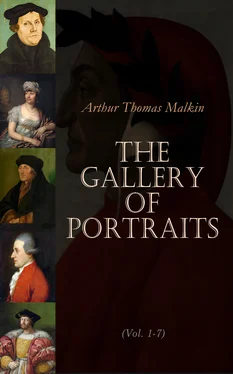At the age of twenty-seven he was appointed superior of a society which had for its object the instruction and encouragement of female converts to the Church of Rome; and from this time he took up his abode with his uncle. In this house he first became known to Bossuet, by whose recommendation he was intrusted with the conduct of a mission, charged with the duty of reclaiming the Protestants in the province of Poitou, in the memorable year 1685, when the Huguenots were writhing under the infliction of the dragonnade, employed by the government to give full effect to the revocation of the edict of Nantes. Fenelon had no mind to have dragoons for his coadjutors, and requested that all show of martial terror might be removed from the places which he visited. His future proceedings were in strict conformity with this gentle commencement, and consequently exposed him to the harassing remonstrances of his superiors.
His services in Poitou were not acknowledged by any reward from the government, for Louis XIV. had begun to look coldly upon him; but it was not his fortune to remain long in obscurity. Amongst the visitors at his uncle’s house, whose friendship he had the happiness to gain, was the Duke de Beauvilliers, a man who could live at the court of Louis without ceasing to live as a Christian. This nobleman was appointed in the year 1689 Governor of the Duke of Burgundy, the grandson of Louis, and heir, after his father the Dauphin, to the throne of France. His first act was to appoint Fenelon preceptor to his royal charge, then in his eighth year, and already distinguished for the frightful violence of his passions, his insolent demeanour, and tyrannical spirit. The child had, however, an affectionate heart and a quick sense of shame. Fenelon gained his love and confidence, and used his power to impress upon him the Christian’s method of self-government. His headstrong pupil was subdued, not by the fear of man, but by the fear of God. In the task of instruction less difficulty awaited him; for the young prince was remarkably intelligent and industrious. The progress of a royal student is likely to be rated at his full amount by common fame; but there is reason to believe that in this case it was rapid and substantial.
In 1694 he was presented to the Abbey of St. Valery, and two years afterwards promoted to the Archbishopric of Cambray, with a command that he should retain his office of preceptor, giving personal attendance only during the three months of absence from his diocese which the Canons allowed. In resigning his abbey, which from conscientious motives he refused to keep with his archbishopric, he was careful to assign such reasons as might not convey an indirect censure of the numerous pluralists among his clerical brethren. Probably this excess of delicacy, which it is easy to admire and difficult to justify, was hardly requisite in the case of many of the offenders. One of them, the Archbishop of Rheims, when informed of the conscientious conduct of Fenelon, made the following reply: “M. de Cambray with his sentiments does right in resigning his benefice, and I with my sentiments do very right in keeping mine.” This mode of defence is capable of very general application, and is in fact very generally used, being good for other cases beside that of pluralities.
This preferment was the last mark of royal favour which he received. Louis was never cordially his friend, and there were many at court eager to convert him into an enemy. An opportunity was afforded by Fenelon’s connexion with Madame Guyon.
It is well known that this lady was the great apostle of the Quietists, a sect of religionists, so called, because they studied to attain a state of perfect contemplation, in which the soul is the passive recipient of divine light. She was especially noted for her doctrine of pure love; she taught that Christian perfection consisted in a disinterested love of God, excluding the hope of happiness and fear of misery, and that this perfection was attainable by man. Fenelon first became acquainted with her at the house of his friend the Duke de Beauvilliers, and, convinced of the sincerity of her religion, was disposed to regard her more favourably from a notion that her religious opinions, against which a loud clamour had been raised, coincided very nearly with his own. It has been the fashion to represent him as her convert and disciple. The truth is, that he was deeply versed in the writings of the later mystics; men who, with all their extravagance, were perhaps the best representatives of the Christian character to be found among the Roman Catholics of their time. He considered the doctrine of Madame Guyon to be substantially the same with that of his favourite authors; and whatever appeared exceptionable in her expositions, he attributed to loose and exaggerated expression natural to her sex and character.
The approbation of Fenelon gave currency to the fair Quietist amongst orthodox members of the church. At last the bishops began to take alarm: the clamour was renewed, and the examination of her doctrines solemnly intrusted to Bossuet and two other learned divines. Fenelon was avowedly her friend; yet no one hitherto had breathed a suspicion of any flaw in his orthodoxy. It was even during the examination, and towards the close of it, that he was promoted to the Archbishopric of Cambray. The blow came at length from the hand of his most valued friend. He had been altogether passive in the proceedings respecting Madame Guyon. Bossuet, who had been provoked into vehement wrath, and had resolved to crush her, was sufficiently irritated by this temperate neutrality. But when Fenelon found himself obliged to publish his ‘Maxims of the Saints,’ in which, without attacking others, he defends his own views of some of the controverted points, Bossuet, in a tumult of zeal, threw himself at the feet of Louis, denounced his friend as a dangerous fanatic, and besought the King to interpose the royal arm between the Church and pollution. Fenelon offered to submit his book to the judgment of the Pope. Permission was granted in very ungracious terms, and presently followed by a sentence of banishment to his diocese. This sudden reverse of fortune, which he received without even whispering a complaint, served to show the forbearance and meekness of his spirit, but it deprived him of none of his powers. An animated controversy arose between him and Bossuet, and all Europe beheld with admiration the boldness and success with which he maintained his ground against the renowned and veteran disputant; and that, too, in the face of fearful discouragement. The whole power of the court was arrayed against him, and he stood alone; for his powerful friends had left his side. The Cardinal de Noailles and others, who had in private expressed unqualified approbation of his book, meanly withheld a public acknowledgment of their opinions. Whilst his enemy enjoyed every facility, and had Louis and his courtiers and courtly bishops to cheer him on, it was with difficulty that Fenelon could find a printer who would venture to put to the press a work which bore his name. Under these disadvantages, harassed in mind, and with infirm health, he replied to the deliberate and artful attacks of his adversary with a rapidity which, under any circumstances, would have been astonishing. He was now gaining ground daily in public opinion. The Pope also, who knew his merit, was very unwilling to condemn. His persecutors were excited to additional efforts. He had already been banished from court; now he was deprived of the name of preceptor, and of his salary—of that very salary which some time before he had eagerly offered to resign, in consideration of the embarrassed state of the royal treasury. The flagging zeal of the Pope was stimulated by threats conveyed in letters from Louis penned by Bossuet. At length the sentence of condemnation was obtained; but in too mild a form to satisfy altogether the courtly party. No bull was issued. A simple brief pronounced certain propositions to be erroneous and dangerous, and condemned the book which contained them, without sentencing it in the usual manner to the flames.
Читать дальше












